Debian and Ubuntu are two of the most common distributions among Linux users. Choosing the right distro between Debian vs Ubuntu depends on what you expect from your Linux distro. Ubuntu is the most popular distribution of Linux and Debian is an older distribution on which Ubuntu is based.
Besides macOS and Microsoft Windows, Linux is the third most popular OS. There are hundreds of Linux-based operating systems (distributions or distros) in the Linux world, most of which extend from other existing distros. Just a few of them are original, and Debian is one of them.
The history of Debian and Ubuntu
Debian is one of the oldest Linux-based OSs that is still available. It was created in 1993 by Ian Murdock, an American software engineer. It has been the foundation of many later Linux distributions, including Ubuntu.
Ubuntu was considered a Debian fork built based on Debian’s “testing” snapshot release. It was introduced in 2004 by a computer software corporation called Canonical, founded by South African entrepreneur Mark Shuttleworth.
Debian and Ubuntu have certain features in common, but there are also plenty of differences. This article will review the two most popular Linux distros on the market, Debian vs Ubuntu, to show their distinctive differences. You can get the latest version of Debian from debian.org, and Ubuntu’s from ubuntu.com.
What Is Debian?
Debian is a free operating system to use. The operating system is a collection of simple programs and utilities that make your machine work. The kernel is the most basic program at the heart of the operating system on your machine. It does all the simple housework and allows you to start other applications.
Debian uses the Linux kernel, a fully free piece of software launched by Linus Torvalds and endorsed by thousands of programmers globally. A large part of the simple tools that fill the operating system come from the GNU Project and this software is also free.
Another aspect of the operating system is application software, programs that help get the job done, from editing records to running a company, to playing games, to writing other software. Debian comes with more than 1,500 free packages, pre-compiled software presented in a nice format for quick installation on your desktop.
 Trusted for Stability
Trusted for Stability
Go for a Cloudzy Debian VPS and get a reliable, high-performance server with a super-stabel operating system optimized for functionality.
Get your Debain VPSWhat Is Ubuntu?
Ubuntu is a Linux Distribution or Linux Distro. In Linux vernacular, the distribution is a variant of the operating system that is based on the Linux kernel. There are hundreds of different Linux distros in the world. Many are free and have groups of users that offer feedback and support to each other.
But installing a free Linux distro with minimal support options can intimidate the average computer user. This is where Ubuntu comes in. Ubuntu, which is distributed by a corporation called Canonical, is an example of a commercial project focused on the Linux kernel.
Established by businessman and philanthropist Mark Shuttleworth, Canonical’s goal is to provide a free software platform for developers and users. Rather than being a fee for the operating system, Canonical’s business model relies on offering commercial support for its goods.
 Linux Hosting Simplified
Linux Hosting Simplified
Want a better way to host your websites and web apps? Developing something new? Simply don’t like Windows? That’s why we have Linux VPS.
Get your Linux VPSDebian vs Ubuntu
Debian vs Ubuntu: Release
There is a noticeable difference between Debian and Ubuntu in their release cycle. Debian has three different releases: stable, testing, and unstable. All stable distributions have a fixed release date.
Debian’s stable branch includes only software that has been successfully tested. It has fewer updates and is much more stable. Examples of stable releases are Debian 10 “Buster” and Debian 9 “Stretch.”
Ubuntu has a more restrictive release plan than Debian. Its developers release the LTS (long-term support) version every two years. This version is formally supported for five years. They also release a new update of Ubuntu every six months based on the Debian testing branch.
Debian vs Ubuntu: Desktop Environment
Both Debian and Ubuntu allow you to choose from a variety of DEs (desktop environments). The Debian Installer helps you choose which desktop interface you need. Ubuntu has a default DE, but Debian doesn’t have one.
You can also choose other Ubuntu flavors that come with different DEs. For example, Lubuntu uses LXQt, Xubuntu uses the Xfce desktop, and Ubuntu MATE uses the MATE desktop.
But you can install multiple desktop environments in Debian and easily switch between them. When you compare it to Ubuntu, Debian is a lightweight distro because of the type of DE it uses. This means that Debian would be a better choice for old hardware.
Debian vs Ubuntu: Software, Drivers, and Firmware
Both Debian and Ubuntu come with a collection of pre-installed applications where you’ll find the usual software options, such as Microsoft Office alternatives, web browsers, and file managers. They both have the same system for managing packaging software.
Since Ubuntu releases are forked from Debian’s unstable branch, many of their features are similar. Most software tools and solutions are accessible in both distros, but their software policy is quite different.
Debian only has open-source software in its repositories by default. It does not contain proprietary software. Ubuntu, on the other hand, emphasizes functionality. It has a vast repository of software that includes both free and paid software. Both Debian and Ubuntu support “Snap,” a standardized software package and deployment system developed by Canonical, the company developing Ubuntu.
While Ubuntu provides as many drivers and firmware as possible and allows you to install and customize the required drivers and firmware automatically during or after installation, Debian lacks some of the essential proprietary firmware by default. You need to enable the repository yourself and install it manually. That’s because Debian doesn’t contain any proprietary blobs (meaning closed-source binary drivers).
Debian vs Ubuntu: Performance
Debian comes with some essential pre-installed software and does not come pre-packaged with many extra applications. As a result, it takes less power and operates seamlessly on a wide range of devices, including old computing machines, and is a super-fast and lightweight system. Even distributions based on Unstable or Testing branches provide better performance than Ubuntu.
In exchange, Ubuntu provides some of the latest features available, and that requires more resources. It’s more suited to modern and powerful machines. On Ubuntu, some software can be installed to make the system lighter. In general, Linux-based systems are much better at performing than macOS and Windows. They provide a unique collection of features that are not comparable to those available for Windows and macOS users.
Debian vs Ubuntu: Security and Stability
If you are searching for a Linux-based OS to run on your server, security is a deciding factor. While Ubuntu is the most common server choice, Debian is a more acceptable option for corporate servers.
All Debian software packages are provided with security or important upgrades on time. Like Ubuntu, Debian 10 also comes with AppArmor enabled by default, which provides an extra layer of protection for some sensitive applications. However, the security perspective and firewall configuration in Debian are a little more complicated than in Ubuntu.
With its stable branch, Debian can provide excellent stability. If you upgrade software packages, anything that has worked before will rarely break. Ubuntu continually pulls in upgrades, and with new features, you sometimes get new bugs and unexpected results. That’s why Ubuntu is better suited for home use.
When it comes to Linux distributions for servers, stability means that scripts or configurations behave as you expect, without any unexpected changes. Debian keeps almost all software locked in the same version and only fixes security holes. That’s why Debian doesn’t surprise you when you upgrade packages, and therefore it is preferred for servers.
Also Read: How to find OS version in Linux?
|
Debian |
Ubuntu |
|
| Release Plan | Three different releases; stable, testing, unstable | Release the long-term-support version every two years |
| Desktop Environment (DE) | Variety of Desktop environments with no default DE | Variety of Desktop environment with a default DE |
| Size | More lightweight | Less lightweight |
| Software Policy | Includes only open-source software | Includes both free and paid software |
| Requirments | Operatable on a wide range of devices including old machines | Requires more resources (more suited to modern machines) |
| Functionality | 4\5 | 5\5 |
| Performance and speed | 5\5 | 4\5 |
| Security and stability | 5\5 | 4\5 |
| Support and Community | 5\5 (more technical-oriented) | 5/5 (more beginner-oriented) |
Debian vs Ubuntu: Support and Community
Debian is a community-driven distribution, governed by a committee of elected volunteer developers. This community has its internal structure and legislation. Ubuntu is developed by the Canonical Organization, which has absolute power over Ubuntu and decisions concerning it.
Both Debian and Ubuntu have strong community support, although the Debian community is more technical-oriented, and Ubuntu focuses mostly on beginners. As far as Debian is concerned, many decisions, particularly on legal issues, are discussed at length in Debian forums. Canonical supports Ubuntu sells support contracts for Ubuntu and makes compatibility deals with hardware manufacturers.
 Linux Hosting Simplified
Linux Hosting Simplified
Want a better way to host your websites and web apps? Developing something new? Simply don’t like Windows? That’s why we have Linux VPS.
Get your Linux VPSConclusion
Choosing a Linux distro depends on what you expect from one. Debian is a lighter distro that can provide acceptable stability. If you’ve got old hardware, Debian is an excellent option for you. It is also a more appropriate option for corporate servers.
Their software policies are somewhat different. By default, Debian only has open-source software in its repositories. But Ubuntu has an extensive repository of software that includes both free and paid software. Debian is super-fast and very lightweight. In exchange, Ubuntu offers the newest features and is better suited to modern devices.
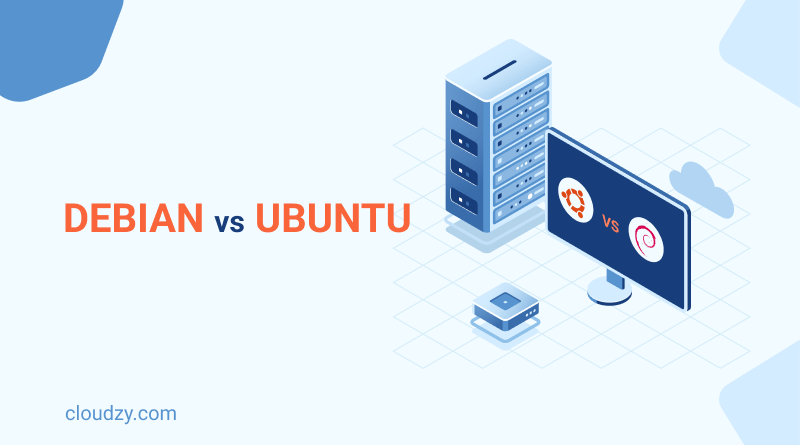



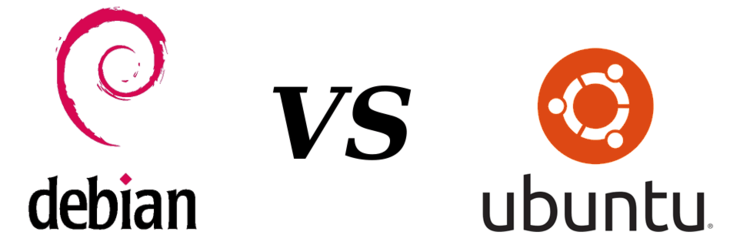
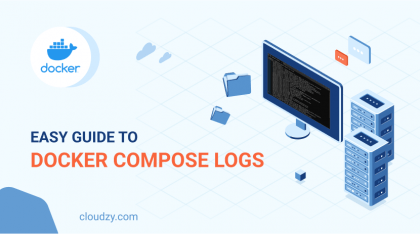
![How to Make a Modded Minecraft Server? 👾 [2024 Guide]](https://cloudzy.com/wp-content/uploads/How-to-Host-a-Modded-Minecraft-Server-1-420x234.png)
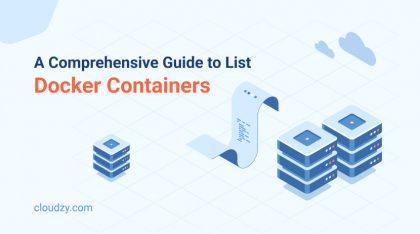
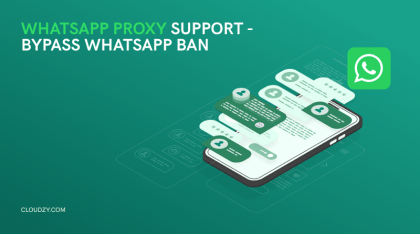

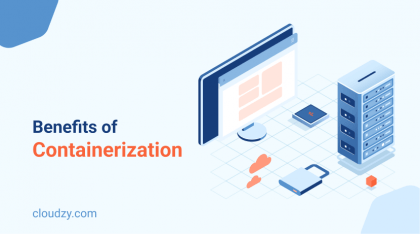
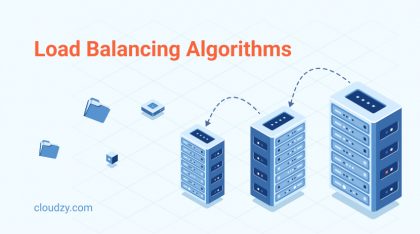

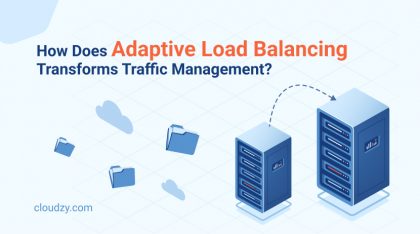
I suggest anyone who has never used Linux to start out with Ubuntu after a while you can change your distro
I really like ubuntu 18.04, it is really easy to use and it is LTS
For a web server I would prefer Centos 8 or Debian 10
I really liked the part about debian vs ubuntu server. The main difficulty with Debian is to install wifi drivers, other than that it’s great
I’ve been using Ubuntu for several years because a long time ago, it had a much easier installer. Today I tried Debian 11 in a virtual machine and while Debian 11 as a guest OS had 150 processes running, Ubuntu 20.04.3 with the same applications, desktop, and setup had 350. I understand that the VM will be accessing hardware differently, but I can’t help but think that Debian probably uses few processes on bare metal as well.
I was interested in having the latest software, so I added a few PPA’s and shortly after I had problems updating and installing software due to conflicts. For the moment, Debian 11 (which just came out) has many packages which are newer versions of software, and the package lists on Distrowatch are less comprehensive for Ubuntu.
I will be using flatpaks, snaps, and appimages where I need latest software, and I’ll likely try Debian on my host machine very soon.
Thank you a million times for sharing your experience with everyone here. 🍃💛 The Debian VPS hosting we offer has the leading-edge hardware infrastructure, lightning-fast speed, and unrivaled price to take online hosting to the next level.